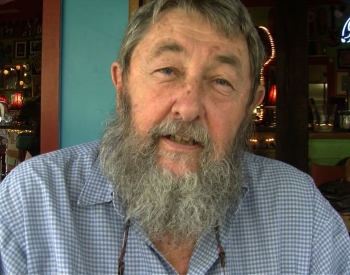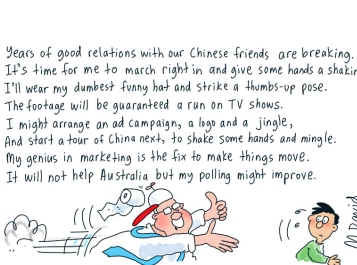'"We thought we understood their problems better than they did. We don’t.” Well, apparently we do — the whitefella politicians are the ones who will decide.'
~ Mungo MaCallum
WE KNOW Scott Morrison seldom takes much notice of those who disagree with him.
The great marketeer is a master of distraction, obfuscation and when all else fails, downright mendacity. But we might have thought that he could at least agree with himself.
However, there he was last week offering two completely contradictory messages to Australia’s Indigenous communities and their many supporters.
Responding to the current 'Closing the Gap' report, Morrison sounded sensible, compassionate, even conciliatory:
Closing the Gap has never really been a partnership with Indigenous people. We perpetuated an ingrained way of thinking passed down by two centuries or more that we knew better than our Indigenous people. We don’t.
We also thought we understood their problems better than they did. We don’t. They live them. We must see the gap we wish to close not from our viewpoints but from the viewpoint of Indigenous Australians.
Well said. And about bloody time. The speech would have provided new hope to First Australians and their supporters that finally, the Government was listening, that it would actually allow those affected by its decisions to have some say in them.
But the hope was dashed quite literally within minutes. When it came to the question of recognition in the Constitution, Morrison went straight back to the conservative playbook. Not only was the 'Uluru Statement from the Heart' off the table, permanently and irrevocably, but even the token recognition espoused by the Government itself was now at risk — a referendum might not be held in the life of the Parliament after all.
The reason for the backflip? There was a lack of consensus about just what was being proposed. Why, even the two sides of politics in the Parliament could not come together. True, but that is not the whole story.
In fact, Labor is united in wishing to deliver the Uluru Statement, in which a Voice for Indigenous Australians would be embedded in the Constitution — no ifs, no buts, no divisions. It is the Coalition Government that is split, with the hard-liners refusing to countenance even the Clayton’s version, in which a voice might be legislated by parliament with the possibility – indeed, given history, the likelihood – it might become inconvenient.
This wishy-washy compromise has, of course, been comprehensively rejected by the Indigenous leaders who sweated for months over Uluru and this is the real point. The fact that Morrison and Anthony Albanese are at odds across the table of the House of Representatives should be entirely irrelevant.
“We thought we understood their problems better than they did. We don’t.” Well, apparently we do — the whitefella politicians are the ones who will decide. We will listen and consult only when it suits us. A genuine partnership would not involve a summary rejection of the wishes of those most affected — it would be working to implement them, not slide away from the difficulties but confront them and deal with them.
But the Coalition’s reactionary rump is opposed and that is the end of the matter. If it wasn’t, the High Court’s controversial and, dare one add, confusing verdict on the deportation case has not helped. It has no immediate application to the issues surrounding a referendum, but it is already being spun by the referendum’s opponents as some kind of special treatment — privileges denied to other Australians.
A spurious argument and one based on ignorance. If the rump actually wanted to know how special treatment operated in practice, I would refer them to Kevin Carmody’s searing song. But why change the ingrained way of thinking passed down over two centuries and more?
Mungo MacCallum is a veteran journalist who worked for many years in the Canberra Press Gallery. This article was published on 'Pearls and Irritations' and is republished with permission.
Support independent journalism Subscribe to IA.












